Month: December 2018
Why ‘F*ck’ Is the Word of the Year
Meghan Daum in Words That Matter:
 Ah, fuck! What an indispensable, multitasker of a word it has become! No longer relegated to that marginalized category once known as profanity, fuck now wears many syntactical hats and is a staple of Trump-era vocabulary. In addition to being a fun way to embed a little malediction into words that otherwise might be chalked up as run-of-the-mill resistance jargon (“inter-fucking-sectional,” “patri-fucking-archy”), fuck is enjoying a long tenure as a synonym for shit. Not giving a shit (which sounds downright 1980s) has now evolved into “not giving a fuck.” By extension, you can now describe something as “[adjective] as fuck” (abbreviated for tweeting purposes to “AF”) You can be tired as fuck, sick as fuck, angry as fuck, and so on. I guess if you find yourself in an especially tragic situation (for instance, banned from Twitter), you can be fucked as fuck.
Ah, fuck! What an indispensable, multitasker of a word it has become! No longer relegated to that marginalized category once known as profanity, fuck now wears many syntactical hats and is a staple of Trump-era vocabulary. In addition to being a fun way to embed a little malediction into words that otherwise might be chalked up as run-of-the-mill resistance jargon (“inter-fucking-sectional,” “patri-fucking-archy”), fuck is enjoying a long tenure as a synonym for shit. Not giving a shit (which sounds downright 1980s) has now evolved into “not giving a fuck.” By extension, you can now describe something as “[adjective] as fuck” (abbreviated for tweeting purposes to “AF”) You can be tired as fuck, sick as fuck, angry as fuck, and so on. I guess if you find yourself in an especially tragic situation (for instance, banned from Twitter), you can be fucked as fuck.
Can you imagine if Rhett Butler had said to Scarlet O’Hara, “Frankly my dear, I don’t give a fuck”? Instead of embodying the essence of male privilege, he’d come across as someone with a top-rated podcast. Or a person with a lot of Instagram followers — a fuck-ton of followers, even.
There’s a linguistic satisfaction to saying fuck. The word has nice consonants. The feeling of curling your lower lip around your lower teeth to make the “f” sound is a reliably good one. There’s a deeper visceral satisfaction, too.
More here.
RAVI SHAVI: “COURAGE” OFFICIAL VIDEO
The Art of Boredom
Andrew Bowie in IAI:
 The English word ‘boredom’, the French ‘ennui’, and the German ‘Langeweile’ are hardly synonyms – the first possibly deriving from the activity of boring wood, the next having to do with a feeling of annoyance, the last, which means ‘long while’, referring to the slow passing of time. Then again, if we think someone is boring they will probably be annoying, and time spent with them will feel unpleasantly long, so the terms make related sense. The relationship to the world involved in each term is evidently negative. ‘Langeweile’ implies, for example, that the meaningfulness of time, which is structured by desires, intentions, hope, anticipation, etc., has been reduced to a sense of time as empty because it lacks these projective qualities. However, boredom may not be thought of as simply negative. Nietzsche, for example, contends that boredom has a dialectical counterpart: ‘For the thinker and for all inventive spirits boredom is that unpleasant “doldrums” of the soul which precedes the happy journey and merry winds; he has to bear it, has to wait for its effect on him’. Boredom can, therefore, be seen as necessary to the generation of new meaning.
The English word ‘boredom’, the French ‘ennui’, and the German ‘Langeweile’ are hardly synonyms – the first possibly deriving from the activity of boring wood, the next having to do with a feeling of annoyance, the last, which means ‘long while’, referring to the slow passing of time. Then again, if we think someone is boring they will probably be annoying, and time spent with them will feel unpleasantly long, so the terms make related sense. The relationship to the world involved in each term is evidently negative. ‘Langeweile’ implies, for example, that the meaningfulness of time, which is structured by desires, intentions, hope, anticipation, etc., has been reduced to a sense of time as empty because it lacks these projective qualities. However, boredom may not be thought of as simply negative. Nietzsche, for example, contends that boredom has a dialectical counterpart: ‘For the thinker and for all inventive spirits boredom is that unpleasant “doldrums” of the soul which precedes the happy journey and merry winds; he has to bear it, has to wait for its effect on him’. Boredom can, therefore, be seen as necessary to the generation of new meaning.
But what sort of phenomenon is boredom? If we go to a football match and it ends in a goalless draw, someone who analyses tactics may have found it fascinating for the ways the two sides’ tactics cancelled each other out, but someone else, for whom goals and spectacular action are what gives the game its point, may have found it boring. So is boredom something merely ‘subjective’? Significantly, this question resembles the perennial debates over whether judgements about art – which can include the judgement that something is boring – are ‘just subjective’. People make opposing judgements with respect to what is boring and what is of aesthetic value all the time. What these judgements have in common is that they both derive from the idea that some connections with things in the world involve the presence or absence of certain kinds of value. The idea that these are solely subjective comes from the fact that such judgements may appear irredeemably contested. However, construing ‘subjective’ this way is questionable. Judgements of this kind involve criteria, such as a football game being boring because of its lack of goals.
More here.
Palaces for the People: How to Build a More Equal and United Society
Owen Hatherley in The Guardian:
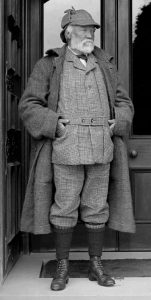 For the sociologist Eric Klinenberg, a vision of the good city begins in the local library. It’s a place where a huge amount of knowledge is available permanently, free of charge. It’s a computer centre; it’s a place where everyone goes, including the marginalised young and elderly. Security is light-touch – “you rarely see a police officer in the library”. It is adaptable in a crisis. During Hurricane Sandy, a branch library in Staten Island became the place where local people sheltered and where relief was coordinated. In north-west Bangladesh, libraries float on moored boats in flood-prone areas. All this passes almost unnoticed. Libraries are closing across the UK and the US at a scarily rapid rate (nearly 130 have closed in the past year, it was recently revealed). The public library is not, and inherently never can be, a market, and so, Klinenberg writes, “If it didn’t already exist, it’s hard to imagine our society’s leaders inventing it.”
For the sociologist Eric Klinenberg, a vision of the good city begins in the local library. It’s a place where a huge amount of knowledge is available permanently, free of charge. It’s a computer centre; it’s a place where everyone goes, including the marginalised young and elderly. Security is light-touch – “you rarely see a police officer in the library”. It is adaptable in a crisis. During Hurricane Sandy, a branch library in Staten Island became the place where local people sheltered and where relief was coordinated. In north-west Bangladesh, libraries float on moored boats in flood-prone areas. All this passes almost unnoticed. Libraries are closing across the UK and the US at a scarily rapid rate (nearly 130 have closed in the past year, it was recently revealed). The public library is not, and inherently never can be, a market, and so, Klinenberg writes, “If it didn’t already exist, it’s hard to imagine our society’s leaders inventing it.”
Klinenberg, who comes from a similar Chicago community milieu as his friend Barack Obama, has written a paean to libraries, parks, playgrounds and other public spaces, but he is unable to keep the bleaker realities of urban (and, unusually, suburban) life out of his would-be-inspiring “Aren’t Cities great?” narrative. What are clearly meant to be instructive just-so stories and heartwarming anecdotes are often much more grim and upsetting than he seems to think they are. He’s well aware that there is a crisis in the US – he names opioids, housing costs that are now out of control, racial politics that are more tense than ever, collapsing infrastructure and undrinkable water, and inequality that has become insulting: “When millions lost their homes in the foreclosure crisis, the most affluent Americans locked up their spoils, buying ‘safe deposit boxes in the sky’ in soaring urban condominium towers. Those who could afford it went one step further, buying survivalist retreats.” Much of this could equally be said of the UK.
This is about as angry and vehement as the usually cosy world of American liberal urbanism can get. At the heart of the book is that idea of the library or park rather than the market as the real agora, the place where urban life is lived at its best, an example of the “social infrastructure” that could really rebuild America.
More here.
It’s Time to Drop the ‘LGBT’ From ‘LGBTQ’
Jonathan Rauch in The Atlantic:
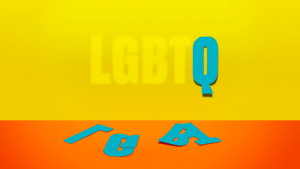 Frank kameny, the last century’s greatest gay-rights activist, filed the first-ever Supreme Court petition challenging discrimination against homosexuals. He led some of the first gay-rights demonstrations. He was the first openly gay congressional candidate. He spearheaded the challenge to the psychiatric establishment’s categorization of homosexuality as a mental illness. He fought tirelessly against sodomy laws. He did a lot more than that. But there is one thing he never did—at least to my own recollection and that of associates of his whom I consulted. He did not use the term LGBTQ, or any of its variations.
Frank kameny, the last century’s greatest gay-rights activist, filed the first-ever Supreme Court petition challenging discrimination against homosexuals. He led some of the first gay-rights demonstrations. He was the first openly gay congressional candidate. He spearheaded the challenge to the psychiatric establishment’s categorization of homosexuality as a mental illness. He fought tirelessly against sodomy laws. He did a lot more than that. But there is one thing he never did—at least to my own recollection and that of associates of his whom I consulted. He did not use the term LGBTQ, or any of its variations.
This is partly because he was a creature of his era, born in the 1920s and active in an age when the whole argot was different. But he lived until 2011, well into the age of LGBTQ. He had plenty of time to make peace with the term, but his friends say he abjured it. “My recollection is LGBT or its derivatives were expressly disliked by Frank,” one of them told me. “He would use gay to cover the full range; or gay and lesbian.” Another said: “Frank was quite indignant about the alphabet soup. When it started in the ’80s with gay and lesbian, he correctly predicted that there would be no end of it.”
Kameny especially prized, among his many accomplishments, his slogan “Gay is good!”—a proud claim that homosexuals are heterosexuals’ moral as well as legal equals. He wasn’t excluding anyone by using the word gay. He didn’t mean that gay is good but lesbian, bisexual, and transgender are not.
More here.
Is the Psychology of Deadly Force Ready for the Courts?
Zachary Siegel in Undark:
 ON OCTOBER 2, 2018, police psychologist Laurence Miller took the stand to testify in the defense of Jason Van Dyke, a white police officer who shot Laquan McDonald, a black teenager from Chicago’s West Side, in 2014. The facts of the case didn’t look good for Van Dyke. A 13-year veteran of the Chicago Police Department, he had shot McDonald 16 times within seconds of exiting his squad car. Though McDonald was holding the knife he had reportedly used to damage a patrol vehicle, the 17-year-old was shot while walking away from cops in the middle of the street. None of these events were in dispute. The shooting had been captured by another police vehicle’s dashboard camera, and Van Dyke was charged with first-degree murder, 16 counts of aggravated battery with a firearm, and one count of official misconduct.
ON OCTOBER 2, 2018, police psychologist Laurence Miller took the stand to testify in the defense of Jason Van Dyke, a white police officer who shot Laquan McDonald, a black teenager from Chicago’s West Side, in 2014. The facts of the case didn’t look good for Van Dyke. A 13-year veteran of the Chicago Police Department, he had shot McDonald 16 times within seconds of exiting his squad car. Though McDonald was holding the knife he had reportedly used to damage a patrol vehicle, the 17-year-old was shot while walking away from cops in the middle of the street. None of these events were in dispute. The shooting had been captured by another police vehicle’s dashboard camera, and Van Dyke was charged with first-degree murder, 16 counts of aggravated battery with a firearm, and one count of official misconduct.
The 67-year-old Miller, who lives in Boca Raton, Florida, was not there to argue about external events. Instead, he asked jurors to focus on Van Dyke’s perception of the shooting. With the lights dimmed in the crowded courtroom, Miller presented a slideshow titled, “The Neuropsychology of Deadly Force Encounters.” In life-and-death situations, he explained, the body’s stress response can distort cognition, perception, and memory. For police officers, this can lead to a phenomenon he referred to as “deadly force mindset,” where the officer, flooded with neurotransmitters and hormones that ensure survival of the moment, feels his or her only option is to kill or be killed. Van Dyke, Miller argued, should be found not guilty of the charges against him. Jurors scribbled notes throughout Miller’s testimony.
The use of psychologists in courtrooms is nothing new, of course, and defense attorneys and prosecutors alike have long relied on expert testimony to help divine the complex soup of chemical hormones and electrical impulses that drive human behavior. But the use of psychology in the defense of police officer shootings is less common — in part because so few officers ever end up on trial.
More here.
Michael Lewis on the inside story of Trump’s shambolic transition team
Michael Lewis in The Guardian:
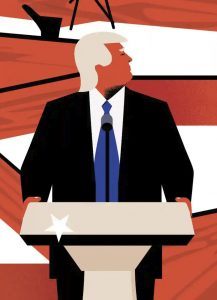 The first time Trump paid attention to any of this was when he read about it in the newspaper. The story revealed that Trump’s very own transition team had raised several million dollars to pay the staff. The moment he saw it, Trump called Steve Bannon, the chief executive of his campaign, from his office on the 26th floor of Trump Tower, and told him to come immediately to his residence, many floors above. Bannon stepped off the elevator to find Christie seated on a sofa, being hollered at. Trump was apoplectic, yelling: You’re stealing my money! You’re stealing my fucking money! What the fuck is this?
The first time Trump paid attention to any of this was when he read about it in the newspaper. The story revealed that Trump’s very own transition team had raised several million dollars to pay the staff. The moment he saw it, Trump called Steve Bannon, the chief executive of his campaign, from his office on the 26th floor of Trump Tower, and told him to come immediately to his residence, many floors above. Bannon stepped off the elevator to find Christie seated on a sofa, being hollered at. Trump was apoplectic, yelling: You’re stealing my money! You’re stealing my fucking money! What the fuck is this?
Seeing Bannon, Trump turned on him and screamed: Why are you letting him steal my fucking money? Bannon and Christie together set out to explain to Trump federal law. Months before the election, the law said, the nominees of the two major parties were expected to prepare to take control of the government. The government supplied them with office space in downtown DC, along with computers and rubbish bins and so on, but the campaigns paid their people. To which Trump replied: Fuck the law. I don’t give a fuck about the law. I want my fucking money. Bannon and Christie tried to explain that Trump couldn’t have both his money and a transition.
Shut it down, said Trump. Shut down the transition.
More here.
Richard Dawkins and Bret Weinstein talk about evolution
Overlooking Guantánamo
Stephen Benz at The NER:
 In such circumstances, the “Guantánamo Blues” that the anonymous writer struggled with in the 1930s became all the more acute. Visiting journalists in the 1960s and 1970s reported on racial tensions, drug and alcohol problems, and occasional violence. According to a 1973 article in Esquire, “Guantánamo is a good place to become an alcoholic. During the last twelve months gin has been the leading seller at the base Mini-Mart, with vodka a close second.”
In such circumstances, the “Guantánamo Blues” that the anonymous writer struggled with in the 1930s became all the more acute. Visiting journalists in the 1960s and 1970s reported on racial tensions, drug and alcohol problems, and occasional violence. According to a 1973 article in Esquire, “Guantánamo is a good place to become an alcoholic. During the last twelve months gin has been the leading seller at the base Mini-Mart, with vodka a close second.”
A strange place to begin with, Gitmo became even stranger during the Cold War period, given that it was a US military facility on the sovereign territory of a country aligned with the Soviet bloc. By the time I stood at the Malones Lookout in 1998, with the Cold War supposedly a thing of the past, Gitmo seemed like a weird anachronism of both neo-colonialism and the Cold War. My opinion at the time was that Guantánamo was outdated and unnecessary; keeping it seemed counterproductive, and returning it to Cuba seemed like the right thing to do. I had said as much in some of my conversations with Cubans. In fact, I had told many of my interlocutors that I had a gut feeling President Clinton was going to normalize relations with Cuba and begin the process of returning Guantánamo before he left office in two years’ time.
more here.
Friday Poem
Lunar Eclipse
A maid comes running into the house
talking about things beyond belief,
about the sky all turned to blue glass,
the moon to a crystal of black quartz.
It rose a full ten parts round tonight,
but now it’s just a bare sliver of light.
My wife hurries off to fry roundcakes,
and my son starts banging on mirrors:
it’s awfully shallow thinking, I know,
but that urge to restore is beautiful.
The night deepens. The moon emerges,
then goes on shepherding stars west.
by Mei Yao-ch’en (1002-1060)
from Mountain Home: The Wilderness Poetry of Ancient China
Counterpoint, 2002
translated from the Chinese by David Hinton
What Do Religious Voters Want?
Adam Willis at The Boston Globe:

HOW HAS A foul-mouthed, womanizing, Biblically illiterate populist earned the broad democratic endorsement of socially conservative, Christian voters? It’s a question that has prompted much liberal hand-wringing in the United States, but it has found an even more extreme manifestation in the overwhelmingly Catholic Philippines.
In May 2016, months before Donald Trump claimed the White House, the Philippines voted Rodrigo Duterte to that country’s presidency. A crass, fire-breathing strongman with a shadowy history of violence in the southern city of Davao, where he earned the nickname “the Death Squad Mayor,” Duterte won a landslide plurality on fantastical campaign promises to clear Metro Manila traffic — some of the worst in the world — in 100 days, to weed out corruption at its roots, and, in his banner program, to scrub the country of crime and poverty through an unforgiving war on drugs.
more here.
The Enduring, Incandescent Power of Kate Bush
Margaret Talbot at The New Yorker:
 Female pop geniuses who exercise their gifts in rampant, restless fashion over decades, writing, performing, and producing their own work, are as rare as black opals. Shape-shifting brilliance and an airy indifference to what’s expected of you are not the music industry’s favorite assets in any performer, but they are probably easier to accept in a man than in a woman. And such a musician, even today, is subject to the same pressures that have always hindered women’s artistic expression. Like the thwarted writers whom Virginia Woolf described in “A Room of One’s Own,” the female pop original is “strained and her vitality lowered by the need of opposing this, of disproving that”—by the refusal to please and accommodate that only a deep belief in one’s own gift can counteract. “What genius, what integrity it must have required in the face of all that criticism, in the midst of that purely patriarchal society,” Woolf writes, “to hold fast to the thing as they saw it without shrinking.”
Female pop geniuses who exercise their gifts in rampant, restless fashion over decades, writing, performing, and producing their own work, are as rare as black opals. Shape-shifting brilliance and an airy indifference to what’s expected of you are not the music industry’s favorite assets in any performer, but they are probably easier to accept in a man than in a woman. And such a musician, even today, is subject to the same pressures that have always hindered women’s artistic expression. Like the thwarted writers whom Virginia Woolf described in “A Room of One’s Own,” the female pop original is “strained and her vitality lowered by the need of opposing this, of disproving that”—by the refusal to please and accommodate that only a deep belief in one’s own gift can counteract. “What genius, what integrity it must have required in the face of all that criticism, in the midst of that purely patriarchal society,” Woolf writes, “to hold fast to the thing as they saw it without shrinking.”
more here.
Elaine Pagels is famous for asking hard questions. Her latest: ‘Why Religion?’
Harry Bruinius in The Christian Scence Monitor:
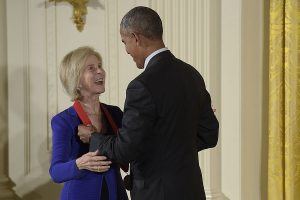 Elaine Pagels, people say, is a heretic. It’s an ancient accusation, of course, and it hardly wields as much power as it used to, especially in the free-wheeling religious landscape of America. And Ms. Pagels is, in fact, one of the globe’s foremost experts in early Christian heresies. But as a woman who has been disrupting established orthodoxies for nearly half a century, her name still has the power to arouse disdain in certain religious circles. “You know, people have sometimes called me ‘Elaine Pagan’,” the Princeton University professor says during an interview with the Monitor, smiling as she reflects on the trajectory of her life’s work, her many orthodox critics, and her new book, “Why Religion? A Personal Story.” Forty years ago, Pagels’ first book, “The Gnostic Gospels,” was an unlikely sensation. A young historian without tenure and a specialist who read 1st century languages like Coptic, she was one of the first to illuminate an ancient trove of long-lost gospels and other writings about Jesus, writings which were simply stumbled upon by a local farmer near the Egyptian town Nag Hammadi in 1945.
Elaine Pagels, people say, is a heretic. It’s an ancient accusation, of course, and it hardly wields as much power as it used to, especially in the free-wheeling religious landscape of America. And Ms. Pagels is, in fact, one of the globe’s foremost experts in early Christian heresies. But as a woman who has been disrupting established orthodoxies for nearly half a century, her name still has the power to arouse disdain in certain religious circles. “You know, people have sometimes called me ‘Elaine Pagan’,” the Princeton University professor says during an interview with the Monitor, smiling as she reflects on the trajectory of her life’s work, her many orthodox critics, and her new book, “Why Religion? A Personal Story.” Forty years ago, Pagels’ first book, “The Gnostic Gospels,” was an unlikely sensation. A young historian without tenure and a specialist who read 1st century languages like Coptic, she was one of the first to illuminate an ancient trove of long-lost gospels and other writings about Jesus, writings which were simply stumbled upon by a local farmer near the Egyptian town Nag Hammadi in 1945.
…Still, at the heart of “Why Religion?” is a quiet meditation on the meaning of human mortality, and the grief and soul-shattering anguish the famous scholar experienced over the course her life. More than 25 years ago, her firstborn son, then 6, collapsed in her arms and died of a rare respiratory illness. Just a year later, with her two younger children under her care, she lost her husband, who fell to his death while hiking in Colorado. “I needed to write this, partly because I needed to bring forth those experiences that I had buried, because they were so difficult to deal with at the time,” Pagels says of the reasons for writing such an intensely personal book. “And I think for anyone, whether it’s people who write poetry or music or any other kind of expressive forms, you can ask, ‘Why do we really need to do that?’ ”
More here.
Here are 6 hints that Baby Jesus stories were late additions to early Christian lore
Valerie Tarico in AlterNet:
 Picture a creche with baby Jesus in a manger and shepherds and angels and three kings and a star over the stable roof. We think of this traditional scene as representing the Christmas story, but it actually mixes elements from two different nativity stories in the Bible, one in Matthew and one in Luke, with a few embellishments that got added in later centuries. What was the historical kernel? Most likely we will never know, because it appears that the Bible’s nativity stories are themselves highly-embellished late add-ons to the Gospels.
Picture a creche with baby Jesus in a manger and shepherds and angels and three kings and a star over the stable roof. We think of this traditional scene as representing the Christmas story, but it actually mixes elements from two different nativity stories in the Bible, one in Matthew and one in Luke, with a few embellishments that got added in later centuries. What was the historical kernel? Most likely we will never know, because it appears that the Bible’s nativity stories are themselves highly-embellished late add-ons to the Gospels.
Here are six hints that the story so familiar to us might have been unfamiliar to early Jesus worshipers.
1. Paul’s Silence –The earliest texts in the New Testament are letters written during the first half of the first century by Paul and other people who used his name. These letters, or Epistles as they are called, give no hint that Paul or the forgers who used his name had heard about any signs and wonders surrounding the birth of Jesus, nor that his mother was a virgin impregnated by God in spirit form. Paul simply says that he was a Jew, born to a woman.
2. Mark’s Silence –The Gospel of Mark—thought to be the earliest of the four gospels and, so, closest to actual events—doesn’t contain a nativity or “infancy” story, even though it otherwise looks to be the primary source document for Matthew and Luke. In Mark, the divinity of Jesus gets established by wonders at the beginning of his ministry, and some Christian sects have believed that he was adopted by God at this point. Why is Mark thought to be where the authors of Matthew and Luke got material? For starters, some passages in Mark, Matthew, and Luke would likely get flagged by plagiarism software. But in the original Greek, Mark is the most primitive and least polished of the three. It also is missing powerful passages like the Sermon on the Mount and has endings that vary from copy to copy. These are some of the reasons that scholars believe it predates the other two. Unlike Paul, the author of Mark was writing a life history of Jesus, one that was full of miracles. It would have been odd for him to simply leave out the auspicious miracles surrounding the birth of Jesus—unless those stories didn’t yet exist.
More here.
The Ultimate Best Books of 2018 List
Emily Temple in Literary Hub:
 It’s mid-December, and likely you are sick and tired of best-of lists. I know, because I am too—especially after reading 52 of them and tracking their contents for the very piece you are reading—so trust me when I say that the monstrosity below is the last best-books-of-2018 list you’ll ever have to read.
It’s mid-December, and likely you are sick and tired of best-of lists. I know, because I am too—especially after reading 52 of them and tracking their contents for the very piece you are reading—so trust me when I say that the monstrosity below is the last best-books-of-2018 list you’ll ever have to read.
To put this together, as I did last year, I looked at all of the end-of-year best books lists I could find online, tallied up their picks, and figured out which individual books were the most often recommended. This year, I counted 52 lists from 37 sources, which added up to a grand total of 880 books. I didn’t include any books from the UK lists, since they often have slightly different publication schedules. I tried my best to balance fiction and nonfiction, but some places only offered one or the other at the time of writing, and the final compilation is probably a little heavy on the fiction side.
So while I’m sure I didn’t get every list, and more are no doubt appearing even as I write this, I feel I can reasonably attest that the books below are the ones that the literary world at large has deemed the “best” of 2018. Does that mean they are actually the best? You’ll have to read them and decide for yourself. But if you’re looking for a relatively sure bet for a gift or some holiday reading, this is a good place to start.
More here.
A History of Cyborg Sex, 2018–73
Cathy O’Neil in the Boston Review:
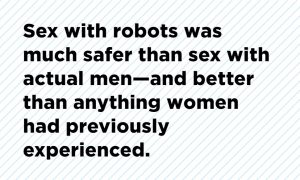 A lot of people don’t know this, but we once thought cyborg sex might be a bad idea. Back in the 2010s, serious concerns were raised by prominent scholars that sex robots were made by men, for men. The general consensus was that cyborg sex would further support the notion that women’s bodies were available for objectification, sexual gratification, and violence.
A lot of people don’t know this, but we once thought cyborg sex might be a bad idea. Back in the 2010s, serious concerns were raised by prominent scholars that sex robots were made by men, for men. The general consensus was that cyborg sex would further support the notion that women’s bodies were available for objectification, sexual gratification, and violence.
Indeed, in the dawn of sex robots and dolls, the evidence was concerning: we saw hordes of male customers, and the robots were typically created to mimic young, passive sex bimbos. Men were even losing the ability to differentiate between “real” and “robot” wives, and people feared that the advent of robot lovers would further create asymmetry in the “marriage market” for women—that women would be confined and pressured into settling for archaic, misogynistic, or even abusive romantic situations.
In short, the advent of cyborg sex was seen as destabilizing, and it was largely expected to tilt the power further toward men.
Now, more than fifty years later, that curious beginning is laughably remote from our current-day relationship with our cyborg lovers, and the evolution of cyborg sex warrants telling.
More here.
The US Poet Laureate examines why and how political poetry is hot again
Tracy K. Smith in the New York Times:
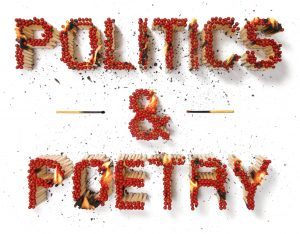 In the mid-1990s, when I was a student of creative writing, there prevailed a quiet but firm admonition to avoid composing political poems. It was too dangerous an undertaking, one likely to result in didacticism and slackened craft. No, in American poetry, politics was the domain of the few and the fearless, poets like Adrienne Rich or Denise Levertov, whose outsize conscience justified such risky behavior. Even so, theirs weren’t the voices being discussed in workshops and craft seminars.
In the mid-1990s, when I was a student of creative writing, there prevailed a quiet but firm admonition to avoid composing political poems. It was too dangerous an undertaking, one likely to result in didacticism and slackened craft. No, in American poetry, politics was the domain of the few and the fearless, poets like Adrienne Rich or Denise Levertov, whose outsize conscience justified such risky behavior. Even so, theirs weren’t the voices being discussed in workshops and craft seminars.
Maybe it was our relative political stability that kept Americans from stepping into the fray. Perhaps America’s individualism predisposed its poets toward the lyric poem, with its insistence on the primacy of a single speaker whose politics were intimate, internal, invisible. Then came the attacks on the World Trade Center in September 2001, and the war in Iraq, and something shifted in the nation’s psyche.
More here.
Sean Carroll’s Mindscape Podcast: Janna Levin on Black Holes, Chaos, and the Narrative of Science
Sean Carroll in Preposterous Universe:
 It’s a big universe out there, full of an astonishing variety of questions and puzzles. Today’s guest, Janna Levin, is a physicist who has delved into some of the trippiest aspects of cosmology and gravitation: the topology of the universe, extra dimensions of space, and the appearance of chaos in orbits around black holes. At the same time, she has been a pioneer in talking about science in interesting and innovative ways: a personal memoir, a novelized narrative of famous scientific lives, and a journalistic exploration of one of the most important experiments of our time. We talk about how one shapes an unusual scientific career, and how the practice of science relates to more traditionally humanistic concerns.
It’s a big universe out there, full of an astonishing variety of questions and puzzles. Today’s guest, Janna Levin, is a physicist who has delved into some of the trippiest aspects of cosmology and gravitation: the topology of the universe, extra dimensions of space, and the appearance of chaos in orbits around black holes. At the same time, she has been a pioneer in talking about science in interesting and innovative ways: a personal memoir, a novelized narrative of famous scientific lives, and a journalistic exploration of one of the most important experiments of our time. We talk about how one shapes an unusual scientific career, and how the practice of science relates to more traditionally humanistic concerns.
More here.
Bernard Williams: Ethics from a Human Point of View
Paul Russell at the TLS:

In an interview that he gave near the end of his life, Williams says that most of his efforts in philosophy are focused on this point: “to make some sense of the ethical as opposed to throwing out the whole thing because you can’t have an idealized version” (Williams’s emphasis). He pursues this fundamental theme by way of his two-sided critique of what he calls “the morality system”. It is two-sided because not only does it aim to discredit the forms of “idealization” that the morality system has encouraged, it also seeks to provide an account of what we are left with when we discard or abandon its assumptions and aspirations. His central text for this programme is Ethics and the Limits of Philosophy (1985). Understood this way, Ethics and the Limits of Philosophy constitutes Williams’s pivotal work, in part because it is his most ambitious and wide-ranging. Beyond that, however, Ethics and the Limits of Philosophy both brings together the diverse threads and strands of his earlier work – much of which is critical in character – and lays the foundation for his later work, particularly his last two books: Shame and Necessity (1993) and Truth and Truthfulness (2002). All these contributions “hang together” (to use Williams’s own expression). In the final analysis, it is not possible to have a complete understanding of the central concerns of Williams’s philosophy without putting Ethics and the Limits of Philosophy at the heart of it.
more here.
